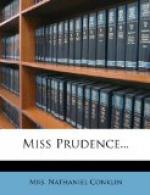I.
After school.
“Our content is our best having.”—Shakespeare.
Nobody had ever told Marjorie that she was, as somebody says we all are, three people,—the Marjorie she knew herself, the Marjorie other people knew, and the Marjorie God knew. It was a “bother” sometimes to be the Marjorie she knew herself, and she had never guessed there was another Marjorie for other people to know, and the Marjorie God knew and understood she did not learn much about for years and years. At eleven years old it was hard enough to know about herself—her naughty, absent-minded, story-book-loving self. Her mother said that she loved story-books entirely too much, that they made her absent-minded and forgetful, and her mother’s words were proving themselves true this very afternoon. She was a real trouble to herself and there was no one near to “confess” to; she never could talk about herself unless enveloped in the friendly darkness, and then the confessor must draw her out, step by step, with perfect frankness and sympathy; even then, a sigh, or sob, or quickly drawn breath and half inarticulate expression revealed more than her spoken words.
She was one of the children that are left to themselves. Only Linnet knew the things she cared most about; even when Linnet laughed at her, she could feel the sympathetic twinkle in her eye and the sympathetic undertone smothered in her laugh.
It was sunset, and she was watching it from the schoolroom window, the clouds over the hill were brightening and brightening and a red glare shone over the fields of snow. It was sunset and the schoolroom clock pointed to a quarter of five. The schoolroom was chilly, for the fire had died out half an hour since. Hollis Rheid had shoved big sticks into the stove until it would hold no more and had opened the draft, whispering to her as he passed her seat that he would keep her warm at any rate. But now she was shivering, although she had wrapped herself in her coarse green and red shawl, and tapped her feet on the bare floor to keep them warm; she was hungry, too; the noon lunch had left her unsatisfied, for she had given her cake to Rie Blauvelt in return for a splendid Northern Spy, and had munched the apple and eaten her two sandwiches wishing all the time for more. Leaving the work on her slate unfinished, she had dived into the depths of her home-made satchel and discovered two crumbs of molasses cake. That was an hour ago. School had closed at three o’clock to-day because it was Friday and she had been nearly two hours writing nervously on her slate or standing at the blackboard making hurried figures. For the first time in her life Marjorie West had been “kept in.” And that “Lucy” book hidden in her desk was the cause of it; she had taken it out for just one delicious moment, and the moment had extended itself into an hour and a half, and the spelling lesson was unlearned and the three hard examples in complex fractions unworked. She had not been ignorant of what the penalty would be. Mr. Holmes had announced it at the opening of school: “Each word in spelling that is missed, must be written one hundred times, and every example not brought in on the slate must be put on the blackboard after school.”




